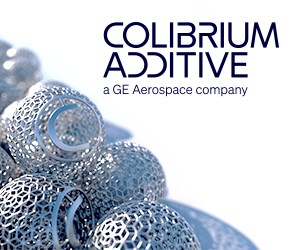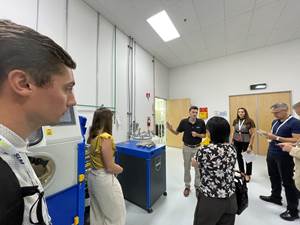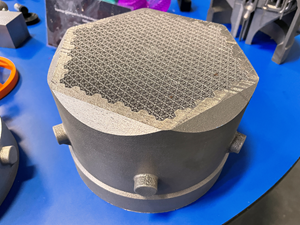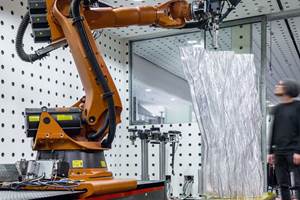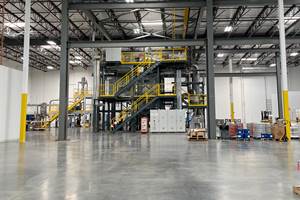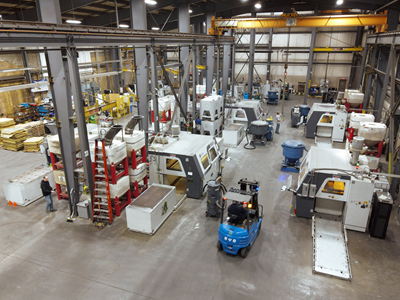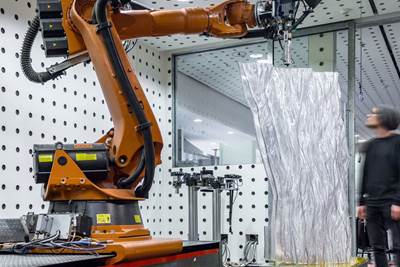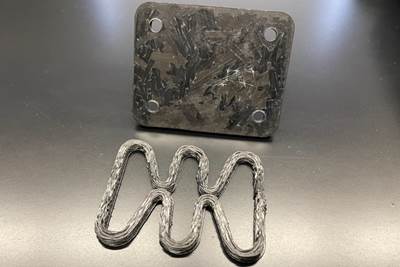Fraunhofer ILT, 6K Additive Partner on AM Life Cycle Assessment
The study conducted at the labs of Fraunhofer ILT analyzes an additively manufactured industrial component that includes the environmental impact from powder, printing and postprocessing.
Share
The assessment found that for Ni718 powder, 6K’s UniMelt process delivered at a minimum a 91% energy reduction and 92% carbon emission reduction from traditional processes. Photo Credit: 6K Additive
6K Additive, a division of 6K, and the Fraunhofer Institute for Laser Technology (ILT), are collaborating to create a complete life cycle assessment (LCA) for additive manufacturing (AM). The study will use sustainably manufactured Ni718 powder, produced by 6K Additive, for an industrial component manufactured on a laser powder bed fusion (LPBF) machine to better understand the carbon footprint from material through AM process and postprocessing.
“There are conflicting views on additive manufacturing regarding its environmental impact compared to traditional manufacturing,” says Dr. Jasmin Saewe, Fraunhofer ILT’s head of department for laser powder bed fusion. “The goal for this study is to analyze factual data to help us understand the real environmental impact for printing a metal AM part using LPBF. We also thought it was extremely important to evaluate the entire process, including powder manufacturing, which is why we partnered with 6K Additive, who has a proven method of sustainable powder manufacturing.”
It is said 6K’s UniMelt platform offers multifaceted sustainability benefits. 6K Additive previously released two life cycle assessment projects for both titanium and nickel powders. This study was conducted by Foresight Management, an independent company that quantified the environmental impact associated with the production of printable metal powders and specifically compared atomization technology methods to 6K Additive’s. It was found that for Ni718 powder, 6K’s UniMelt process, at minimum, delivered a 91% energy reduction and 92% carbon emission reduction from traditional processes. The independent study can be downloaded.
“We are excited to partner with Jasmin and her team at Fraunhofer ILT for this research,” says Frank Roberts, 6K Additive president. “Our previous study clearly highlighted the environmental advantages our UniMelt technology has over atomization, but this collaboration takes it to the next step shedding light on the entire AM process. The market has embraced sustainability and the results of this study will provide the tools to allow customers to identify real solutions and help organizations drive toward carbon neutrality.”
6K Additive says it is the world’s first producer of AM powder made from sustainable sources and offers a full suite of premium powders, including nickel, titanium, copper and refractory metals such as tungsten and rhenium. The UniMelt system is a microwave production-scale plasma system, with a uniform and precise plasma zone with zero contamination and high throughput production capabilities.
- Learn about 6K Additive’s Environmental Sustainability Research Award from the Additive Manufacturing Green Trade Association (AMGTA) for its work on the UniMelt powder manufacturing process.
- Read about the 6K Additive partnership with Incodema3D in which 6K says its nickel alloy 625 powder surpassed every quality measure for powder supply and recycling in tests performed by Incodema3D.
- Take a look at this article which details the results of an independent analysis that shows 6K Additive’s UniMelt process uses 91% less energy with a 92% reduction in carbon emissions over traditional methods for nickel production.
Related Content
The AM Ecosystem, User Journeys and More from Formnext Forum Austin: AM Radio #43
Sessions and conversations at the first U.S. Formnext event highlighted the complete additive manufacturing ecosystem, sustainability, the importance of customer education, AM user journeys and much more.
Read More3D Printed Heat Exchanger Illustrates Siemens' CATCH and Release Approach
Solutions for energy efficiency, sustainability, part repair and more are developing at Siemens’ Charlotte Advanced Technology Collaboration Hub (CATCH) in North Carolina.
Read More3D Printing Brings Sustainability, Accessibility to Glass Manufacturing
Australian startup Maple Glass Printing has developed a process for extruding glass into artwork, lab implements and architectural elements. Along the way, the company has also found more efficient ways of recycling this material.
Read MoreMultimodal Powders Bring Uniform Layers, Downstream Benefits for Metal Additive Manufacturing
A blend of particle sizes is the key to Uniformity Labs’ powders for 3D printing. The multimodal materials make greater use of the output from gas atomization while bringing productivity advantages to laser powder bed fusion and, increasingly, binder jetting.
Read MoreRead Next
Looking to Secure the Supply Chain for Castings? Don't Overlook 3D Printed Sand Cores and Molds
Concerns about casting lead times and costs have many OEMs looking to 3D print parts directly in metal. But don’t overlook the advantages of 3D printed sand cores and molds applied for conventional metal casting, says Humtown leader.
Read More3D Printing Brings Sustainability, Accessibility to Glass Manufacturing
Australian startup Maple Glass Printing has developed a process for extruding glass into artwork, lab implements and architectural elements. Along the way, the company has also found more efficient ways of recycling this material.
Read MoreTo Improve Performance of Compression Molded Composites, Add 3D Printed Preforms
9T Labs' Additive Fusion Technology enables the manufacture of composite structures with as much or as little reinforcement as is necessary, using 3D printed continuous fiber preforms to add strength just where needed.
Read More

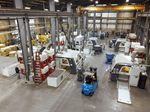

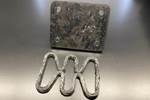
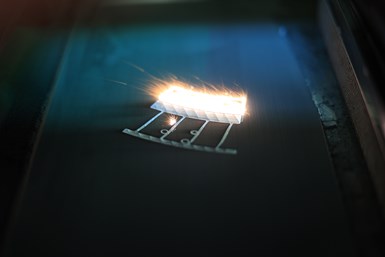

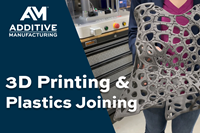
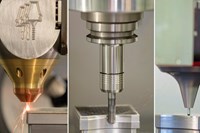


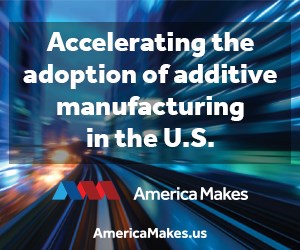
.png;maxWidth=300;quality=90)

